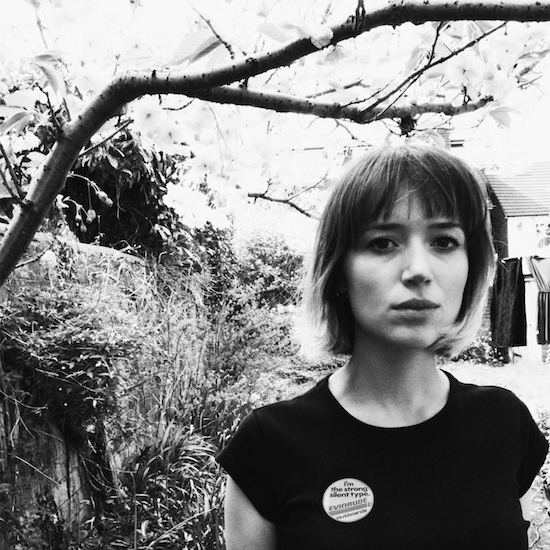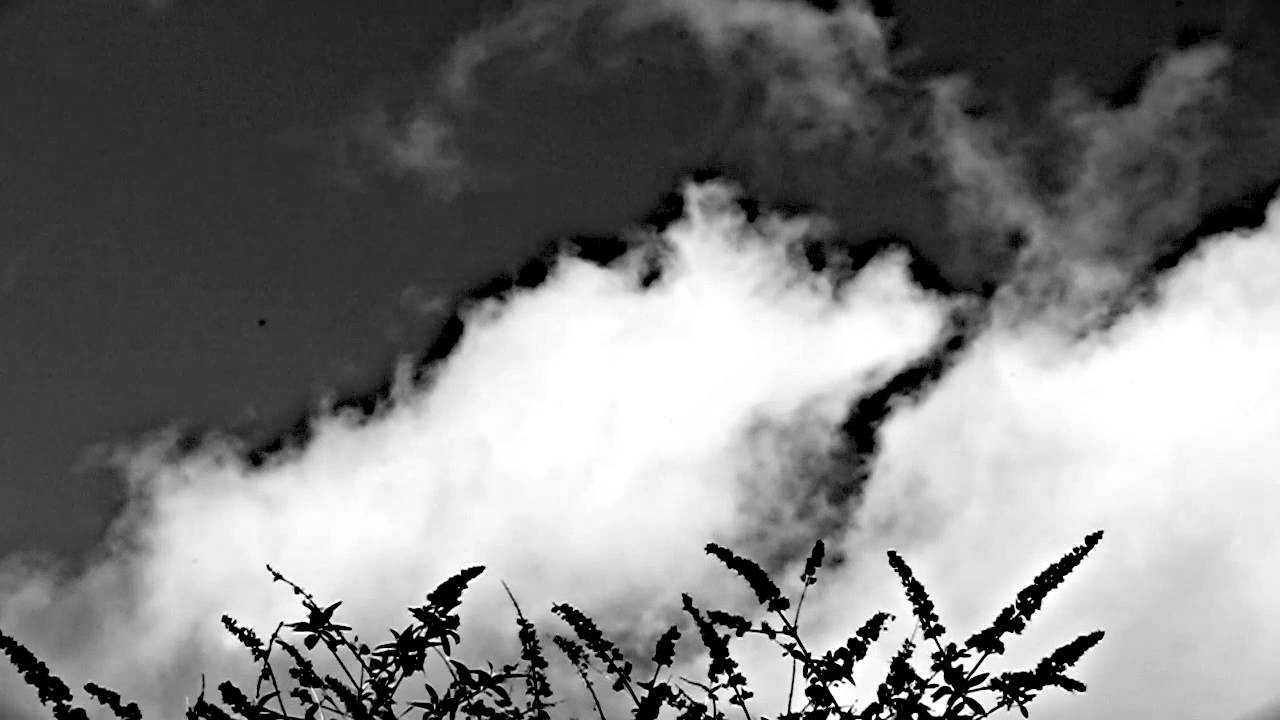Hannah Lou Clark was barely on my radar when I caught her set at Norwich Sound & Vision festival last autumn. I’d been dragging myself around the city for three or four hours, my interest and ability to review the night flagging between coffees. The Mash Tun in the centre of town was rammed when I got there, mostly in anticipation of garage rock duo Bad Grammar. It was a Saturday night in a provincial city and everyone’s new favourite band was coming on in half an hour.
Within 30 seconds of Clark’s solo set starting, the room was silent. She stood alone in the centre of the stage, mostly focussing on the microphone in front of her, pulling the crowd closer with each wave of introspection. Her voice poured over the gentle dissonance suggested by each chord, occasionally rising to full volume when a melody began to break, but mostly remaining bedroom-writing quiet.
Around that time the only thing available from Clark was an eight-minute YouTube video that cut together three static-absorbed demos, some cutting out before their natural conclusions. The outside world eased itself into each track and the whole thing was set to images of a suburban house and the sky. It was, in many ways, the perfect edit after seeing Clark live: sparse and deeply engrossing.
None of this seemed to relate to her previous incarnation as FOE, the banner under which she launched her career half a decade ago. Clark’s work now seemed a million miles away from something that The Guardian had described as a "mix of tacky electronics and slashy guitars [that suggest] a collision between PJ and Peaches". The release of the Silent Type EP last November was no closer to such a review either. It was more confident, more perfectly formed, but no more extroverted.
It’s a record that I’ve found myself coming back to repeatedly, the delicate melody of ‘Kids In Heat’ playing off against the staccato slur of ‘Silent Type’, Clark’s lyrics lyrical and narrative in equal measure. It’s also the first thing that Clark has released independently, putting the record out on her own Quatre Femmes Records. With a string of gigs and festival appearances imminent, we met at The Lexington to discuss writing above a Quakers’ meeting house, production processes and following instinct.
When you were playing in your old guise as FOE, it was more than just noise that was keeping you back, it was an aesthetic. There’s a big change between the stuff you were doing then and what you’re doing now. Were you always writing this sort of stuff?
Hannah Lou Clark: The early FOE demos were probably more similar to the stuff I do now, but it’s more in the production and the way it was all presented, that made it seem quite theatrical. I think it just reached a point where I thought, "This isn’t really me." Then I suppose in playing on my own, that was a way of working it out. Just get up there and be yourself. Which is quite a scary thing because I always had an idea that maybe people expect a certain thing of me. Being in the industry and having a record deal, which I had in FOE, maybe people expect me to be theatrical and quirky and eye-catching. So that all fell away and it’s way more rewarding now. And the reaction – especially at gigs – is a lot better. Because I think people just appreciate honesty. I definitely do.
Was the business side of things part of the thinking in terms of striking out on your own, so that you could mould those expectations too?
HLC: Yeah. Before I had quite a big team and a lot of opinions and I always just kind of did – not always – but did what I was told. Maybe I lost sight of what I actually thought was right and what instinctively felt right for me. So yeah, it’s quite a good opportunity for self-assessment. But, saying that, it’s not like any of it was really contrived. I’ve always just written for catharsis, just to get stuff out.
That word catharsis seems appropriate. It feels like on the EP those songs just came out, they don’t feel bogged down by overwork.
HLC: Yeah. All the songs I end up using and playing, usually I’ll finish a song in a day. I’ve never really been able to force anything. Usually if I have a feeling about something or some kind of basic idea, it’ll happen fairly quickly. And obviously with the EP I was completely left to my own devices so I didn’t have a producer. It was just, I guess, what I thought would embellish the songs to present them in a good way. And maybe there’s some kind of naivety in that. I played everything apart from the drums, and I guess my style of playing isn’t particularly flashy or anything, it’s more about presenting a song in a simple way.
Even to the point of detuning a guitar as part of a riff, as on ‘Silent Type’.
HLC: Yeah. And they were all approached slightly differently. So ‘Silent Type’ I started just with the drum machine, just recorded three-and-a-bit minutes of the drum machine and then played around with the guitar. Then before I wrote the lyrics, I’d committed to that. The other two were more vocal and guitar-based. So I’m quite aware of approaching things differently to get different results. It keeps things interesting, I suppose. In a production sense as well.
Is the process of setting up a space where you feel you’re going to write a particular thing?
HLC: I think so. I mean, probably regardless of where I am, I’ll always write. But it definitely does bring something to the table subconsciously. The place I’ve just been to, just outside of Bedford in the countryside, I knew there’d be nobody around, I’d have totally my own space, this peaceful little village in the middle of nowhere. So in terms of clearing my own head and coming up with some new stuff, I knew that would be useful. And the last EP that I did was written above a Quaker meeting house. That’s just where I lived, it’s kind of coincidental. But it definitely did infiltrate the vibe. And definitely within the themes. ‘Silent Type’, like silent worship. And [there are] the subtle religious references in some of the songs that I wrote in that house. But even there was a fairly peaceful environment. Just a suburban town, pretty quiet, not really any neighbours. I mean, the Quakers were only there twice a week, so you could make a fair bit of noise. They were really up for us making music. A lot of landlords aren’t.
That religious influence seems to be a big part of the departure from your old stuff. Silent Type in particular. The FOE stuff was so extroverted, and Silent Type seems so radically opposed to it.
HLC: I suppose just having "silent" as a mantra for that song lyrically, the way that I approached it, that’s probably why it’s different. I do usually start songs with either a guitar or a piano. It’s definitely the most enjoyable to play live, that one. Even when we add newer stuff to the set, I don’t know why. Some songs just work better than others. But the session I’ve just done, I’m writing a lot more with drum machines, so the new stuff is a lot more in keeping with ‘Silent Type’.
That untitled video you put up on YouTube was pretty much the only thing around before you put your EP out. It seemed like a weird concept with these vignettes dropping in and out…
HLC: I just wanted to capture the house I wrote it in. Working in that house and everything that happened there had a big impact on the songs, so it was more just a piece on the house. Just filming angles from outside, the bricks. For me, I really feel that in the songs. It was just about presenting that. And it’s recorded on tape which I guess you can hear, the fuzziness, but you can definitely hear the surroundings quite nicely on the tape, it’s quite crunchy and distorted and I really like the sound of that. And I suppose it was just dipping my toe in a bit, letting people know I was doing stuff.
And now you’re in control of that in a business sense. How much of that did you learn from your time in FOE, because it seems like the last year or so has really been on an upward curve?
HLC: I guess I did learn stuff from FOE, but having said that, the industry changes all the time. So me being in a house in Farnham, completely separate from anything that’s going on, I wasn’t really sure what to expect. And I guess I was lucky in that I had a bit of a following from the FOE stuff, so to put stuff out under my own name, there were people that were interested in hearing it. So I guess it went from there. I had a few friends that were happy to help me out, blogs, stuff like that.
But it does feel very natural compared to FOE. With that there were major labels jumping over it straight away and it was pretty overwhelming. But this stuff feels like it’s just happening in the way that it should, whatever that means.
Do you try to take that idea into working with other bands on the label? Just letting it take its course?
HLC: I suppose that it sounds a little bit arrogant of me. But I think if you really believe in something… I mean, I’m just happy to help out smaller bands if I can. I’ve been working with a couple of bands that live near where my parents live, like a band called The Venus Lyx who I saw at the Buffalo Bar and they completely blew me away. Because I’ve got my foot in the door a little bit I thought maybe I could help. Maybe because I just feel like everyone should hear this because it’s fucking great. I mean, there’s only so much I can do. But if I can get some people hearing it and get them some shows and stuff like that, hopefully someone with a bit more knowledge will be able to get them that bit further.
When I was talking to Torres a couple of weeks ago, we discussed that idea of setting aside some time to let things go, taking an organised approach to catharsis. Is that difficult to have that degree of time management when you’re doing something inherently creative?
HLC: Yeah, definitely. That’s why I couldn’t do anything else while I was writing. It does take up everything, mentally and physically. Which maybe isn’t great for keeping everything else ticking over, but at the moment my focus is on my own stuff. The label stuff is great but it’s definitely not taking all the focus. I definitely can’t do anything else when I’m writing.
Silent Type is out now on Quatre Femmes Records. Hannah Lou Clark plays Forgotten Fields festival in Tunbridge Wells this Sunday, August 9, before a gig at a new night called Finding The Female Headliner, in conjunction with Amazing Radio, at Birthdays in London next Thursday, August 13, followed by Green Man festival, 22; for full details of her upcoming dates, head to her Facebook




